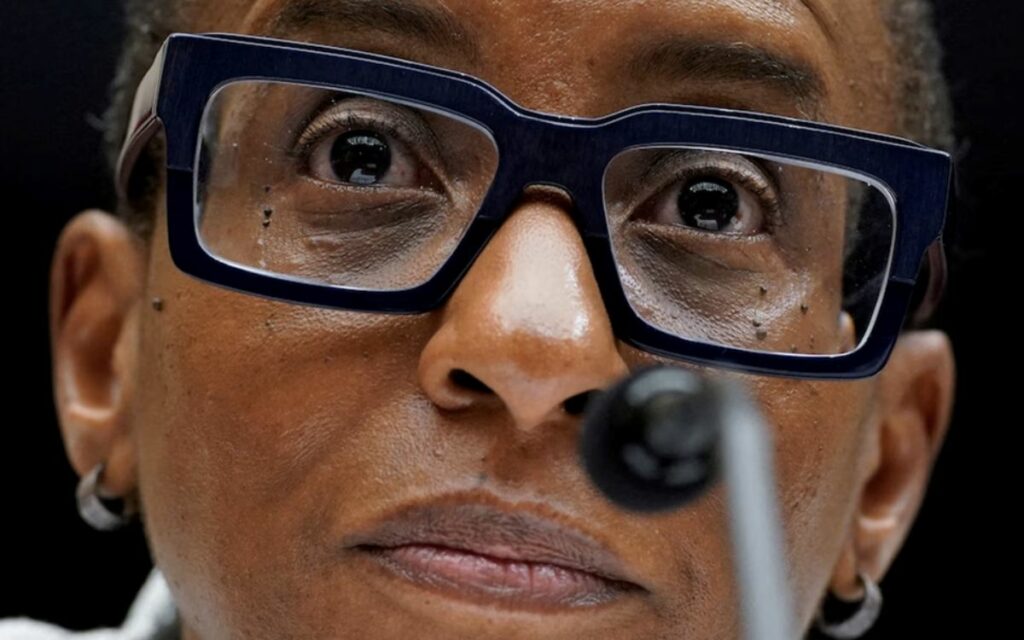
Harvard University President Claudine Gay testifies before a House committee hearing in Washington on Dec. 5. (Ken Cedeno/Reuters)
Exactly a year ago, I wrote about Claudine Gay, the newly appointed President of Harvard University. Ms. Gay represents the new frontier of university administrators. She is intersectional, a person of colour, and determined to advance the cause of DEI. I am reluctant to return to her as a subject because I find her a bore and what she represents unhelpful. But she and two of her administrative colleagues descended upon Washington a couple of weeks back, heralding a warning and a harbinger of what lay ahead at the finest educational institutions in the country. In the worst-prepared example of congressional testimony, Gay and her two colleagues, Elizabeth Magill of the University of Pennsylvania and Sally Kornbluth of the Massachusetts Institute of Technology, embarrassed themselves and the highly regarded establishments they head.
The Chairwoman of the House GOP Conference, Elise Stefanik of New York (R), asked the three presidents if students calling for the genocide of Jews would violate the student codes of conduct at their schools. Instead, they would not give a straight answer, deflecting the question several times, leaving Ms. Stefanik exasperated, the Congressional audience confused, and a watching America bewildered. What became apparent as the testimony continued was the lack of preparation of these three leaders. Somehow, the possibility that this issue might arise evaded them. Their inability to provide an unequivocal “yes” revealed their incompetence and the rising belief at renowned learning centres that some speech deserves protection and some censoring. The lack of institutional integrity staggered even the Biden White House.
After the testimony on December 6th, all of the university presidents faced the withering criticism of alumni, the national press, and many on the right who could not believe that institutional hate speech applied to those who mused there were only two genders or who believed in traditional marriage but not to those who threatened genocide. Harvard’s faculty and staff supportively circled their wagons around Ms. Gay, only to quickly find out she had plagiarized her doctoral dissertation from Dr. Carol Swain of Vanderbilt University. Swain has been outspoken and said the following in response to Gay’s word theft, “I have a problem with the way Harvard has reacted to the entire situation, because it seems like — with the assistance of some of their professors and other elites — they’re trying to redefine what is plagiarism, and they’re making the argument that there are different levels and, by extension, that some of it is acceptable. That is a problem for higher education in America.” In October, after repeated reports of Gay’s alleged misconduct, Harvard Corporation, the oldest Board of Fellows in the Western Hemisphere, initiated an investigation. After reviewing three of her published works, the Corporation cleared Gay. But then came the testimony, further vetting, and more investigations.
As Aaron Sibarium reported in the Washington Beacon on December 19, “The new allegations, which were submitted to Harvard’s research integrity officer, Stacey Springs, include the examples reported by the Washington Free Beacon and other outlets, as well as dozens of additional cases in which Gay quoted or paraphrased authors without proper attribution, according to a copy of the complaint reviewed by the Free Beacon. They range from missing quotation marks around a few phrases or sentences to entire paragraphs lifted verbatim.” Since Gay’s writings are sketchy (she has only published 11 papers), the plagiarism described is profound. Harvard’s integrity officer must first investigate these matters. A serious finding triggers further examination. Sibarium continues, “A guilty finding can result in a range of consequences—including ‘suspension,’ ‘rank reduction,’ and ‘termination of employment.’” Gay’s situation bottomed out further this week, but more on that later.
As for Magill, she was forced to resign the presidency of Penn for her infractions but still sits on the Board. Kornbluth has thus far avoided any punishment other than some tut-tutting on behalf of her board at MIT. Some student groups have voiced concerns, but MIT projects a different aura than Harvard. With 4,700 students enrolled, the institute, located just two miles from Harvard, accepts about 4% of its applicants, projecting a stronger sense of meritocracy than the more progressive brands of both Harvard and Penn. Gay, however, faces an uncertain future.
The history of double standards at Harvard goes back a couple of decades. A leading legal professor, Lawrence Tribe, was caught plagiarizing and escaped punishment. The incident led to calls for Tribe’s sanction from Harvard’s student newspaper, the Harvard Crimson. “Students caught plagiarizing are routinely suspended for semesters or even entire academic years,” the paper wrote. “For professors who plagiarize, however, not even a modicum of punishment seems to be in play.” As this unfolded, more journalists and one professor uncovered or reported more examples of Gay’s plagiarism. The professor sought anonymity to avoid retaliation while, “…the Manhattan Institute’s Christopher Rufo, Karlstack’s Chris Brunet, and the New York Post‘s Isabel Vincent” disclosed other instances of Gay’s sloppy scholarship.
Adding further speculation to the eventual outcome of Gay’s case, former President Barack Obama is said to have advocated for Gay. The New York Post’s Josh Christenson wrote on December 22nd that “Obama, 62, a 1991 graduate of Harvard’s law school, privately urged the university to let Gay remain in office after she testified Dec. 5 before the House Education and Workforce Committee that calls for the genocide of Jews may be permissible under the school’s code of conduct, depending on “context,” according to a report out Friday.” According to Christenson, for the sake of administration stability, an effort was underway to keep Gay in place. Ironically, another member of the Illinois elite, Sally Pritzker, sister of Governor J.B. Pritzker of the “Prairie State,” sits on the Harvard Corporation as Board Chair and will have a significant role to play in whether Gay retains her position.
As the matter has wound its way through various channels, the increased examples of Gay’s inartful practices have led to more calls for her removal. Several news personalities have spoken about the double standard set for students and administrators. Generally sympathetic journalists like John McWhorter of the New York Times and Ruth Marcus of the Washington Post recently suggested Gay cannot continue as president. McWhorter wrote that the more than forty instances of her plagiarism “make it untenable for her to remain in office.” As for Marcus, after a great internal struggle, she confessed that “I take no joy in saying this, but Harvard President Claudine Gay ought to resign. Her track record is unbefitting the president of the country’s premier university. Remaining on the job would send a bad signal to students about the gravity of her conduct.”
The embarrassment for Harvard should dawn on them in the New Year. The effort to call Gay’s plagiarism “duplicative language” fares no better than John Podhoretz’s description of Gay’s works as “stealing somebody else’s words consciously.” They can try to cover up, paint over, or window dress. The facts speak for themselves, and more of the facts only add to the narrative. As Judson Berger reported in National Review, “Plagiarism aside, the president of Harvard has been revealed as an intellectual fraud. She has published eleven papers in her entire career and the cornerstone of her academic record, her doctoral dissertation, contains nothing approaching an original thought — just ask Swain, whose work she relied on and who is now calling for her to be fired. A brief comparison: Larry Summers had published 150 scholarly papers and multiple books by the time he was made president of Harvard in 2001. He was also coming off a stint as Treasury secretary. How far we have fallen. It’s almost as if Claudine Gay wasn’t hired for her scholarship.”
As I suggested in my article a few months ago, Ms. Gay’s best credentials rested in her DEI status. She may escape accountability because her job as president is more about advancing ideology than scholarship. Once again, I confess to taking no joy in pointing out that DEI remains an untested theory about the problem it seeks to solve while providing increasingly problematic results.

Dave Redekop is a retired elementary resource teacher who worked part-time at the St. Catharines Courthouse as a Registrar until being appointed Executive Director at Redeemer Bible Church in October 2023. He has worked on political campaigns since high school and attended university in South Carolina for five years, earning a Master’s in American History with a specialization in Civil Rights. Dave loves reading biographies.




















